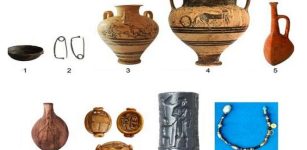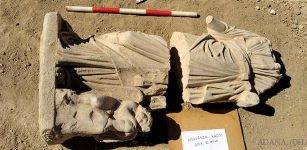Rome’s Most Wanted Enemy – Poison King Mithradates Murdered 80,000 Roman Civilians
Ellen Lloyd - AncientPages.com - In the autumn of 88 B.C., more than 80,000 Roman civilians were murdered. The "mastermind" behind this gruesome attack was Mithradates VI Of Pontus (120-63 BCE), the Poison King.
When news about the horrible massacre reached the Roman Republic, King Mithradates was declared Rome’s ‘most wanted enemy. General Sulla (138 B.C. -79 B.C.) was ordered to seek and destroy the man who was considered a considerable threat to the Roman Republic. However, this was not an easy task, and the wars between King Mithradates and Rome would drag on for decades, spanning two continents.
Left: King Mithradates. Credit: Public Domain - Right: Roman army. Credit: yeowatzup - CC BY 2.0
As Ancient Pages wrote earlier, King Mithradates was often referred to as the Poison King because he was a brilliant toxicologist. He was obsessed with poison and took small doses of a specially prepared poison to help him develop resistance if some should try to poison him.
King Mithradates Wanted To Create An Empire As Powerful As Rome
Mithradates ruled a small but wealthy kingdom on the Black Sea, but his goal was to create a powerful empire to rival Rome’s expanding dominions. Mithradates, who had murdered his own mother to become king, hated the Roman Empire. He regarded “Romans as the enemy of all humanity.”
He recruited ethnically diverse armies from distant lands and carefully looked for weaknesses in the Roman Republic. Perfectly aware of peoples’ dissatisfaction with the expansion of the Roman Empire and the tax burden, King Mithradates used the opportunity to strike back.
In 146 B.C., the Western part of the Mediterranean region and Greece were already under the control of the Roman Empire. In 133 B.C., the Roman Empire expanded and seized Pergamon in the western part of Asia Minor.
Unfair Taxes Ruined Peoples’ Lives
It was not long before Roman colonizers, traders, and tax collectors moved into the province.
The tax collectors were private individuals who demanded huge sums from locals. With the Roman Empire's support, these tax collectors ruined the lives of many poor people. Some families who could afford the demanded tax had to sell their children to pay. Things went so far that even the Romans acknowledged that they had lost control of the tax collection in the new province. People had many reasons to hate Roman rule.
Map of the Kingdom of Pontus, Before the reign of Mithridates VI (dark purple), after his conquests (purple), his conquests in the first Mithridatic wars (pink), and Pontus' ally, the Kingdom of Armenia (green). Credit: Wikipedia
In 88 B.C., a massacre of more than 80,000 unsuspecting civilians took place in Anatolia (western Turkey). The victims were Roman and Italian merchants, slave traders, and tax collectors, the deeply detested settlers in Rome’s new province of Asia. The massacre, carried out by ordinary Anatolians, Greeks, Jews, and other citizens of more than a dozen cities, wiped out the Roman presence in the region.
The organizer of the massacre was King Mithradates. This was the beginning of a long war between the Roman Empire and King Mithradates, legendary ruler of Pontus and creator of a formidable Black Sea Empire.
It took a long time, but finally, Mithridates and his troops were defeated by the Romans, and the king had to go into exile
Written by Ellen Lloyd – AncientPages.com
Updated on Septermber 18, 2022
Copyright © AncientPages.com All rights reserved. This material may not be published, broadcast, rewritten or redistributed in whole or part without the express written permission of AncientPages.com
Expand for referencesMatyszak P. Mithridates the Great: Rome’s indomitable enemy
Peter J. Fast – Mithridates VI of Pontus: The Poison King Who Hated Rome
Mayor A. : The Poison King
More From Ancient Pages
-
 On This Day In History: Henry II Crowned King Of England – On Dec 19, 1154
News | Dec 19, 2016
On This Day In History: Henry II Crowned King Of England – On Dec 19, 1154
News | Dec 19, 2016 -
 Homo Bodoensis Is A New Species Of Human Ancestors Who Lived Half A Million Years Ago
Archaeology | Nov 1, 2021
Homo Bodoensis Is A New Species Of Human Ancestors Who Lived Half A Million Years Ago
Archaeology | Nov 1, 2021 -
 Tomoe Gozen’s Bravery And Strength, Embodiment Of A True Female Samurai
Featured Stories | Oct 16, 2018
Tomoe Gozen’s Bravery And Strength, Embodiment Of A True Female Samurai
Featured Stories | Oct 16, 2018 -
 Feud Between The Medici And The Borgia Families – What Caused The Renaissance Clash?
Featured Stories | Mar 5, 2019
Feud Between The Medici And The Borgia Families – What Caused The Renaissance Clash?
Featured Stories | Mar 5, 2019 -
 Zyndram’s Hill: Oldest-Known Stone Wall – A Masterpiece Of Architecture Found In Poland
Civilizations | Sep 15, 2015
Zyndram’s Hill: Oldest-Known Stone Wall – A Masterpiece Of Architecture Found In Poland
Civilizations | Sep 15, 2015 -
 Unsolved Ancient Mystery Of Lost Pre-Olmec Civilization – Evidence Of Advanced Scientific Knowledge That Could Re-Write History
Ancient Mysteries | Jul 16, 2018
Unsolved Ancient Mystery Of Lost Pre-Olmec Civilization – Evidence Of Advanced Scientific Knowledge That Could Re-Write History
Ancient Mysteries | Jul 16, 2018 -
 Evolution Of Paleodiet At Neolithic Qujialing Site Unveiled By Scientists
Archaeology | Nov 30, 2022
Evolution Of Paleodiet At Neolithic Qujialing Site Unveiled By Scientists
Archaeology | Nov 30, 2022 -
 On This Day In History: Magna Carta Sealed By King John Of England – On June 15, 1215
News | Jun 15, 2016
On This Day In History: Magna Carta Sealed By King John Of England – On June 15, 1215
News | Jun 15, 2016 -
 Silphium – Remarkable Ancient Herb That Mysteriously Vanished
Ancient Traditions And Customs | Jul 10, 2021
Silphium – Remarkable Ancient Herb That Mysteriously Vanished
Ancient Traditions And Customs | Jul 10, 2021 -
 Meskiaggasher: Legendary Founder Of The First Dynasty Of Uruk Who ‘Entered The Sea And Disappeared’
Featured Stories | Apr 20, 2021
Meskiaggasher: Legendary Founder Of The First Dynasty Of Uruk Who ‘Entered The Sea And Disappeared’
Featured Stories | Apr 20, 2021 -
 Mysterious Ancient Giant Jars Made By An Unknown Civilization Discovered In India
Archaeology | Mar 30, 2022
Mysterious Ancient Giant Jars Made By An Unknown Civilization Discovered In India
Archaeology | Mar 30, 2022 -
 Cyprus’s Copper Deposits Created One Of The Most Important Trade Hubs Of The Bronze Age
Archaeology | Mar 17, 2023
Cyprus’s Copper Deposits Created One Of The Most Important Trade Hubs Of The Bronze Age
Archaeology | Mar 17, 2023 -
 Statue of Goddess Hygieia And Eros Unearthed in Ancient City of Anavarza, Southern Turkey
Archaeology | Dec 7, 2017
Statue of Goddess Hygieia And Eros Unearthed in Ancient City of Anavarza, Southern Turkey
Archaeology | Dec 7, 2017 -
 New Details On Neanderthals – Revealed By Museum Exhibition In Norway
Archaeology | Jun 16, 2023
New Details On Neanderthals – Revealed By Museum Exhibition In Norway
Archaeology | Jun 16, 2023 -
 Ceramics Are Telling The Story Of 14th Century Chinese Trade
News | Jun 28, 2023
Ceramics Are Telling The Story Of 14th Century Chinese Trade
News | Jun 28, 2023 -
 Mystery Of The Large Ancient Boulders In Ireland And Britain – Possible Connection To The City Of Troy?
Featured Stories | Oct 17, 2023
Mystery Of The Large Ancient Boulders In Ireland And Britain – Possible Connection To The City Of Troy?
Featured Stories | Oct 17, 2023 -
 Napoleonic Code: Why Was One Of The Most Influential Civil Codes Flawed?
Ancient History Facts | May 16, 2020
Napoleonic Code: Why Was One Of The Most Influential Civil Codes Flawed?
Ancient History Facts | May 16, 2020 -
 Adorable Village Of The Little People In Connecticut
Featured Stories | Jul 25, 2019
Adorable Village Of The Little People In Connecticut
Featured Stories | Jul 25, 2019 -
 Unusual Relic That Mysteriously Disappeared From The Vatican
Ancient Mysteries | Nov 8, 2018
Unusual Relic That Mysteriously Disappeared From The Vatican
Ancient Mysteries | Nov 8, 2018 -
 On This Day In History: The Only English Pope In History Of Catholic Church Elected – On Dec 4, 1154
News | Dec 4, 2016
On This Day In History: The Only English Pope In History Of Catholic Church Elected – On Dec 4, 1154
News | Dec 4, 2016


